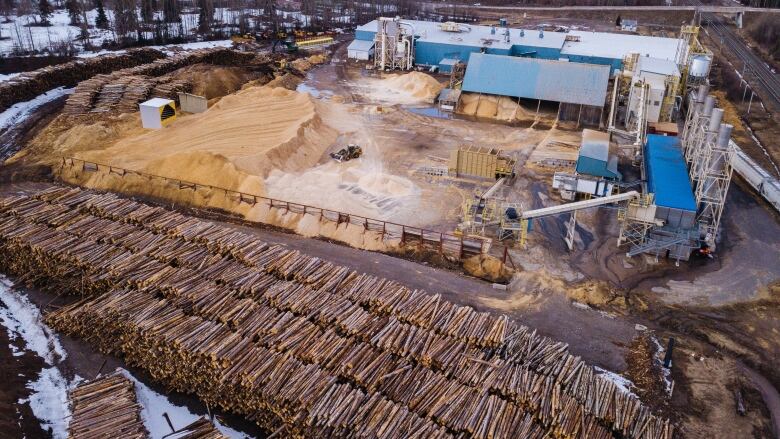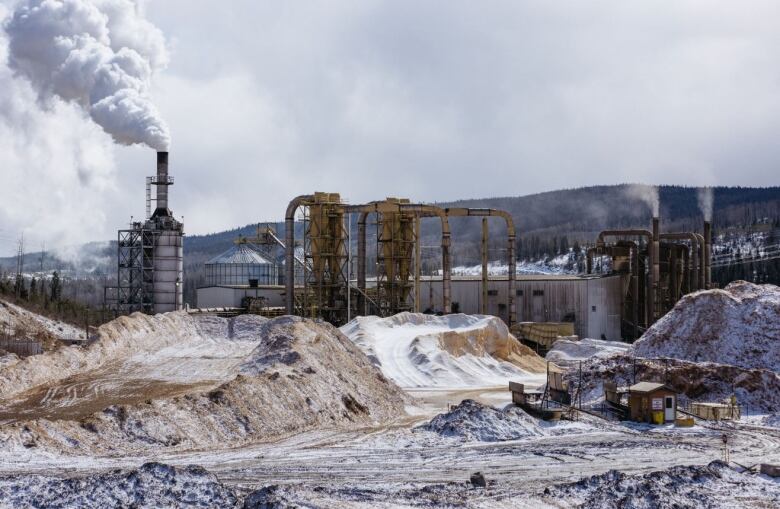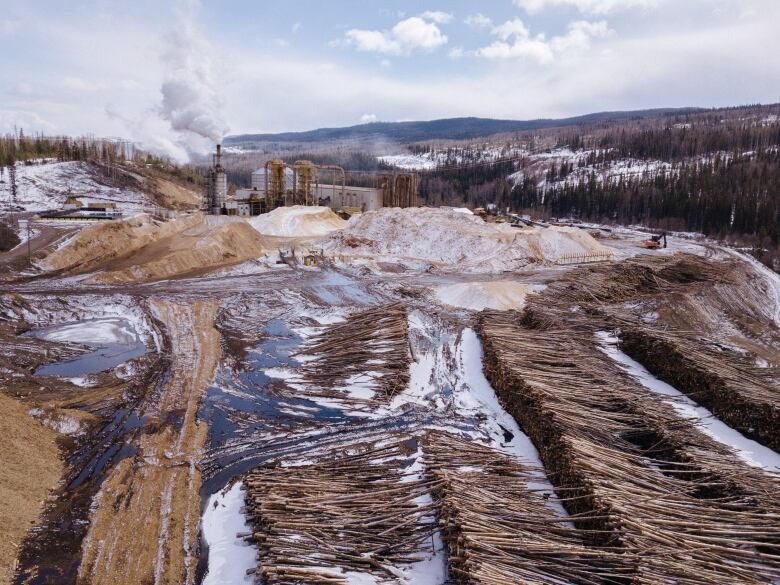B.C. trees are being turned into wood pellets and that's bad for the climate and workforce, critics say
Union, environmental groups call for independent review into industry practices after think-tank report

Piles and piles of raw logs stacked in the yards of wood pellet mills in northern British Columbia were onered flag.
Now, a new report from the Canadian Centre for Policy Alternatives (CCPA) think-tank has caught the attention of environmental groups and a forestry workers'union, who are concernedaboutcompanieschipping whole trees into pellets and exporting them for biofuel.
They say the practice harms the environmentand generates littleemployment, and are calling on the province to suspend the approval of new wood-pellet mills and conduct anindependent review of the industry's activities.
"I don't think that that is something we want from a climate perspective, from a jobs perspective, or from an ecological perspective," saidBen Parfitt, CCPA policy analyst and the author of the report, which was released April 7.
Parfitt's research shows roughly 12 per cent of everything logged in B.C. becomes wood pellets. Pellets are primarily meant to be made from wood waste generated by pulp and saw mills.
The report was released after the CCPA received photographs taken in March by an environmental organization that show large numbers of logs in pellet-mill yardsin northern B.C.
"Whole trees, indeed whole tracts of forest, are being logged with the express purpose of turning trees into a product that is then burned," the report says.

'We need a moratorium right now'
In a 2020 article published in industry magazine Canadian Biomass, the Wood Pellet Association of Canada said B.C.was the largest producer of wood pellets of any sub-national jurisdictionin the worldand exported99 per cent of its 2.5 million tonnesthat year.
But the CCPA report shows the pellet industry generates fewjobs, with only a little more than 300 people half of one per cent of B.C.'s forest industry workforce employed in 14 mills.
That's especially concerning for the Public and Private Workers of Canada union.
"We desperately need to make higher-value forest products and generate far more jobs from each tree we log. There's a place for pellet mills in B.C., but at the end of the line, not the beginning," said union president Gary Fiege in a statement.
One environmental group has called for an immediate halt to the practice of turning treesdirectly into pellets.
"We need a moratorium right now. Logging trees from primary forests just to turn them into pellets and burn them is a climate disaster one that's even worse than burning coal. Scientists are warning that the planet cannot afford the massive increase in carbon emissions that comes from burning wood for power," saidTegan Hansen, forest campaigner with Stand.earth, in a statement.

Pinnacle takeover
Parfitt's researchshows that since 2010, wood pellet companies took at least 1.3 million cubic metres of logs out of B.C. forests. They wereled by Pinnacle Renewable Energy, which got most of its logs from the Quesnel region, including trees from the extremely rare Interior temperate rainforest.
Pinnacle is in the process of being taken over by Drax, a U.K.-based thermal electricity producer. According to a February release from Drax announcing the proposed acquisition,the marketforwood pellets in Europe and Asia is expected to grow in the current decade.
On Tuesday, Pinnacle obtained a final order from the B.C. Supreme Court approving the takeover. Completion of the acquisition is expected April 13.

The B.C. Ministry of Forests did not provide a direct answerwhen asked by CBCNews if it plans to suspend the approval of new pellet mills pending an industry review.
A written statement attributed to a ministry spokesperson saidapproximately 1.2 per centof the provincial timber harvestwent directly to a pellet plant in 2020 and that the provincemonitors the quality of the logs consumed by all timber processing facilities.
The province said of that proportion of the harvest, 540,000 cubic metres was delivered from the bush to pellet plants in B.C. and 200,000 cubic metres was pine beetle wood.
"We try to make sure that the right log gets to the right facility, while low-quality, lower-value logs and residuals are being used in pellet mills," the ministry statement said.
With files from Daybreak North












_(720p).jpg)


 OFFICIAL HD MUSIC VIDEO.jpg)
.jpg)



























































































